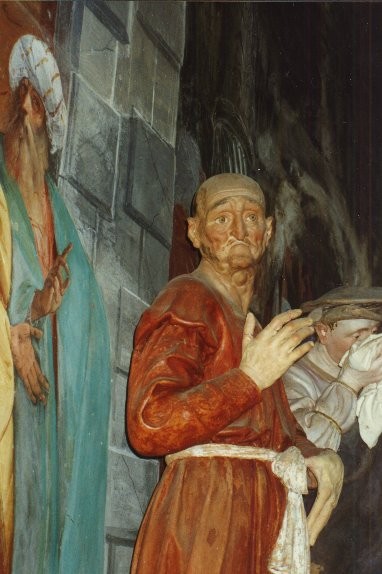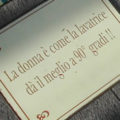“Stanlio, non fare lo stupeedo!”
When an American speaks Italian with a particularly bad accent, Italians often refer to Stanlio e Ollio: Laurel and Hardy, whose accents in the Italian versions of their films are legendarily hilarious, full of flat Rs and words stressed on the wrong syllable.
I used to wonder why these films had been dubbed so badly. Laurel and Hardy are funny enough without silly accents, and why pick on these guys in particular in the dubbing? Everyone else gets dubbed into a normal Italian accent, usually very well.
Then I learned that the films were not initially dubbed by Italians; the voices are those of Laurel and Hardy. When their first talkies came out, it was impossible to dub a new soundtrack onto an existing film. The only way to make an Italian version was to reshoot the whole thing, with the actors doing the Italian dialog themselves. They either read it off cards or memorized it phonetically (as some Italian actors do today when acting in English films). But no one had instructed them in the finer points of Italian pronunciation, so they made mistakes like ‘stuPEEdo’ instead of ‘STUpid-oh.’
Italians found this so funny that, even when technology improved and it became possible to use Italian voices to dub a new soundtrack, the silly accent was maintained, and sticks to this day as a cliche of Americans (or Brits) speaking Italian.
Ask an American to imitate an Italian speaking English, and most of the time you will get the sort of accent heard in American mafia movies, which appears to be loosely based on the pronunciation of someone’s Sicilian or Neapolitan ancestors.
To an Italian ear, there are marked differences in regional accents, and some regional dialects are so different in pronunciation and vocabulary as to be unintelligible to outsiders. Many northern Italians despise the ‘uncouth’ accents of southerners, and would be offended to be lumped into a language category with them.
But maybe that’s changing.
I’ve been meaning for some time to talk about Andrea Camilleri’s Montalbano books, a series of police mysteries set in a small town in Sicily. Part of the appeal is that they are written in a semi-Sicilian dialect, giving a flavor that could be achieved no other way, though the publishers and Camilleri himself initially feared that the general Italian public would not be able to understand it. It turned out not to be a problem, even for me; after the first chapter or so, I didn’t find the language difficult. I’ve noticed that the language is becoming more and more Sicilian as the series goes on; perhaps Camilleri assumes that his devoted fans are now trained to handle it.
Montalbano in book form has been popular for years, and now has been made into a series of TV movies. Accent was again expected to be a problem, so for the first series our hero was made to sound ‘more Roman than Sicilian.’ For the second series, airing now, the accents sound quite Sicilian to me, though not so much that I can’t follow the dialog. Montalbano is wildly popular with all age groups, which seems to be having an interesting side effect: the Sicilian accent is now considered cool. My daughter and her Milanese classmates yesterday begged their school custodian, a Sicilian, to say ‘quattro’ (four), which he pronounces ‘quacchro’. He was baffled, and probably thought at first that they were making fun of him. But they explained that they like to hear him speak because he sounds just like Montalbano; then he was flattered!
The Montalbano books are being translated into English and appear to be selling well. They must lose something without the dialect, but they are still interesting stories with great characters, so I recommend them to mystery-lovers, and to anyone who might enjoy descriptions of Sicilian scenery and food. Montalbano loves good food, and so, presumably, does the author; the stories are frequently side-tracked by mouthwatering descriptions of dishes that Montalbano puts away with pittito lupigno (wolfish appetite). This is one aspect that, sadly, is not preserved in the television series; I guess they didn’t want to make it into a cooking show.
Montalbano links:
- Buy Montalbano books from Amazon US | UK
- About Camilleri and all the books, including those not yet published in English




